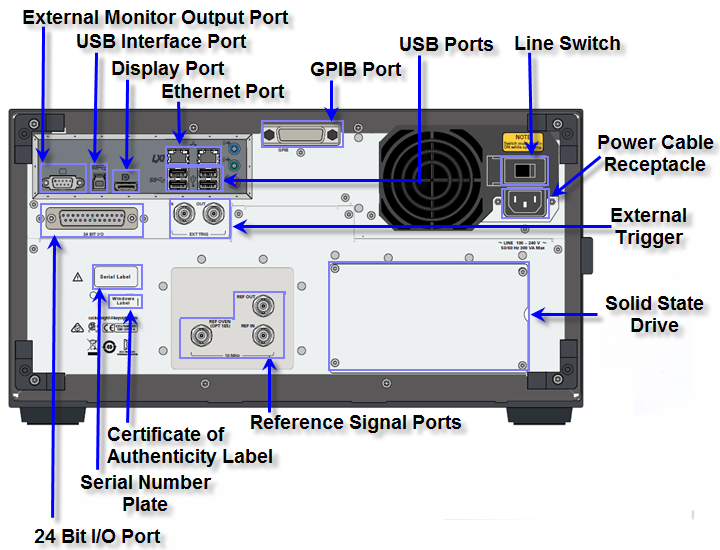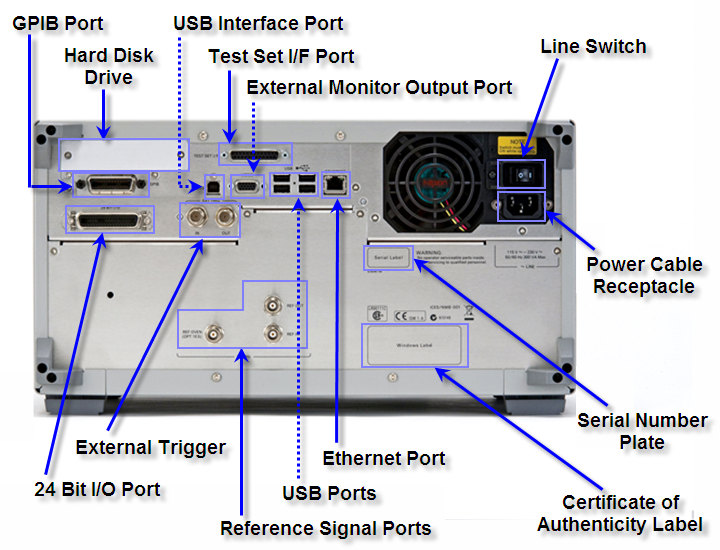


The terminal to which an automatic machine (handler) used on a production line is connected. See 24 Bit (Handler) I/O Port.
Connector type: 36-pin Ribbon (Centronics) connector
The label shows the licence information of the Windows Operating System
A terminal for connecting the E5061B to a LAN (Local Area Network). Connecting this instrument to a LAN enables you to access the hard disk drive of this instrument from an external PC or to control this instrument by using SICL-LAN or telnet.
|
Specification |
Value |
|
Connector type |
8-pin RJ-45 connector |
|
Base standard |
10Base-T/100Base-TX/1000Base-T |
A terminal to which an external color monitor (display device) can be connected.
[S/N prefix MY498/SG498 or above]
Connector type: DisplayPort and 15-pin VGA connector, female
By connecting a color monitor to this terminal, Keysight Technologies logo is shown on an external color monitor as the extended desktop.
When the same information shown on the LCD screen of the main body, Go to Windows -> Control Panel -> Appearance and Personalization -> Connect to an external display. Select “Duplicate these displays” at Multiple displays and then click Apply and OK.
[S/N prefix MY497/SG497 or below ]
Connector type: 15-pin VGA connector, female
By connecting a color monitor to this terminal, the same information is shown on an external color monitor as the clone displays.
A connector to which external trigger signals are input. This connector detects the downward transition from the HIGH state in TTL signals as the trigger signal. To use this connector to generate a trigger, you must set the trigger source to the "external" side. The connector type is BNC, female.
The External Trigger Output Port can output the pulse with the specified polarity and position either before or after the measurement of each point. The connector type is BNC, female.
|
Parameter |
Typical Value |
Condition |
|
HIGH Level Output Voltage |
5 V |
Iout=-50µA |
|
LOW Level Output Voltage |
0 V |
Iout=50µA |
The External Trigger Output Port can safely handle a maximum output current of 50 mA.
The connection of an external controller through General Purpose Interface Bus (GPIB) connector allows you to configure an automatic measurement system.
This GPIB port is used only for controlling the E5061B from an external controller. Use USB/GPIB interface to control other devices from the E5061B. You cannot control other devices from the E5061B through this GPIB port.
Built in hard disk drive (Windows XP)/solid state drive (Windows 7/10)
The specification for the signals is specified in the data sheet.
The reference signal input connector is used for phase-locking the measurement signal from the E5061B to the external frequency reference signal. Inputting reference signal to this connector improves the accuracy and frequency stability of the measurement signal from the E5061B. When the frequency reference signal is input to this connector, the measurement signal from the E5061B is automatically phase-locked to the reference signal. When an input signal is not present, the frequency reference signal inside the E5061B is automatically used. The ExtRef on the instrument status bar is displayed in blue when the system is phase-locked to the external reference signal and in gray when not phase-locked.
When using Option 1E5 (high stability time base), connect this connector to the REF OVEN by using the BNC(m)-BNC(m) cable included with the option.
A connector for outputting the internal frequency reference signal from the E5061B. By connecting this output connector to the external reference signal input connector of another device, the device can be phase-locked to the internal reference signal of the E5061B and used under this condition.
When Option 1E5 (high stability time base) is installed, the reference signal is output from this connector. Connect this connector to the REF IN by using the BNC(m)-BNC(m) adapter included with the option.
Always keep this switch on (|).
Do not use this switch to turn off (O) the mains. Doing so may cause the analyzer to fail. For more information, see the description of the Standby Switch.
The receptacle (outlet) to which the power cable is connected.
To connect the device to a power source (outlet), use the supplied three-prong power cable with a ground conductor. The plug attached to the power cable (on the power outlet side or device side of the cable) serves as the disconnecting device (device that cuts off power supply) of the E5061B. When the power supply must be cut off to avoid such danger as electric shock, pull out the power cable plug (on the power outlet side or device side of the cable). For the procedure for turning off the main in normal use, see the description in Standby Switch.
For more on the power supply, see the Installation Guide.
The label showing the product number, serial number and the installed option number. The accessary and system rack options are not listed on this label. (CFGxxx or ATOxxx in the first line is Keysight Use Only.)
This interface is reserved and currently not available.
Through this port, you can control the E5061B from external controllers. For more information on the measurement system using the USB port, see the USB Remote Control System.
|
Specification |
Value |
|
Connector type |
Universal serial bus (USB), type B (4 contact positions), Female (jack) |
|
Compliance Standards |
USBTMC-USB488 and USB2.0 |
Four USB (Universal Serial Bus) ports are provided that can be used for connecting to ECal (Electronic Calibration) module, USB keyboard, USB mouse, USB memory or a printer. Connecting a designated ECal module to this port enables ECal measurements to be obtained. Connecting a compatible printer to this port enables screen information on the E5061B to be printed. See Using USB for more detail.